- Learning Tips
- Exam Guides
- School Life

Thesis Statements about Social Media: 21 Examples and Tips
- by Judy Jeni
- January 27, 2024
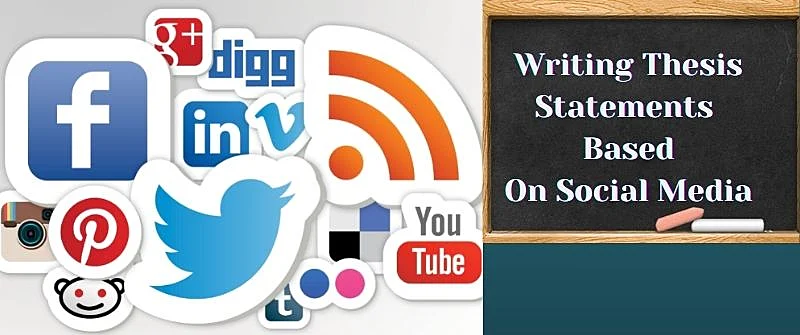
A thesis statement is a sentence in the introduction paragraph of an essay that captures the purpose of the essay. Using thesis statements about social media as an example, I will guide you on how to write them well.
It can appear anywhere in the first paragraph of the essay but it is mostly preferred when it ends the introduction paragraph. learning how to write a thesis statement for your essay will keep you focused.
A thesis statement can be more than one sentence only when the essay is on complex topics and there is a need to break the statement into two. This means, a good thesis statement structures an essay and tells the reader what an essay is all about.
A good social media thesis statement should be about a specific aspect of social media and not just a broad view of the topic.
The statement should be on the last sentence of the first paragraph and should tell the reader about your stand on the social media issue you are presenting or arguing in the essay.
Reading an essay without a thesis statement is like solving a puzzle. Readers will have to read the conclusion to at least grasp what the essay is all about. It is therefore advisable to craft a thesis immediately after researching an essay.
Throughout your entire writing, every point in every paragraph should connect to the thesis. In case it doesn’t then probably you have diverged from the main issue of the essay.
How to Write a Thesis Statement?
Writing a thesis statement is important when writing an essay on any topic, not just about social media. It is the key to holding your ideas and arguments together into just one sentence.
The following are tips on how to write a good thesis statement:
Start With a Question and Develop an Answer

If the question is not provided, come up with your own. Start by deciding the topic and what you would like to find out about it.
Secondly, after doing some initial research on the topic find the answers to the topic that will help and guide the process of researching and writing.
Consequently, if you write a thesis statement that does not provide information about your research topic, you need to construct it again.
Be Specific
The main idea of your essay should be specific. Therefore, the thesis statement of your essay should not be vague. When your thesis statement is too general, the essay will try to incorporate a lot of ideas that can contribute to the loss of focus on the main ideas.
Similarly, specific and narrow thesis statements help concentrate your focus on evidence that supports your essay. In like manner, a specific thesis statement tells the reader directly what to expect in the essay.
Make the Argument Clear
Usually, essays with less than one thousand words require the statement to be clearer. Remember, the length of a thesis statement should be a single sentence, which calls for clarity.
In these short essays, you do not have the freedom to write long paragraphs that provide more information on the topic of the essay.
Likewise, multiple arguments are not accommodated. This is why the thesis statement needs to be clear to inform the reader of what your essay is all about.
If you proofread your essay and notice that the thesis statement is contrary to the points you have focused on, then revise it and make sure that it incorporates the main idea of the essay. Alternatively, when the thesis statement is okay, you will have to rewrite the body of your essay.
Question your Assumptions

Before formulating a thesis statement, ask yourself the basis of the arguments presented in the thesis statement.
Assumptions are what your reader assumes to be true before accepting an argument. Before you start, it is important to be aware of the target audience of your essay.
Thinking about the ways your argument may not hold up to the people who do not subscribe to your viewpoint is crucial.
Alongside, revise the arguments that may not hold up with the people who do not subscribe to your viewpoint.
Take a Strong Stand
A thesis statement should put forward a unique perspective on what your essay is about. Avoid using observations as thesis statements.
In addition, true common facts should be avoided. Make sure that the stance you take can be supported with credible facts and valid reasons.
Equally, don’t provide a summary, make a valid argument. If the first response of the reader is “how” and “why” the thesis statement is too open-ended and not strong enough.
Make Your Thesis Statement Seen
The thesis statement should be what the reader reads at the end of the first paragraph before proceeding to the body of the essay. understanding how to write a thesis statement, leaves your objective summarized.
Positioning may sometimes vary depending on the length of the introduction that the essay requires. However, do not overthink the thesis statement. In addition, do not write it with a lot of clever twists.
Do not exaggerate the stage setting of your argument. Clever and exaggerated thesis statements are weak. Consequently, they are not clear and concise.
Good thesis statements should concentrate on one main idea. Mixing up ideas in a thesis statement makes it vague. Read on how to write an essay thesis as part of the steps to write good essays.
A reader may easily get confused about what the essay is all about if it focuses on a lot of ideas. When your ideas are related, the relation should come out more clearly.
21 Examples of Thesis Statements about Social Media
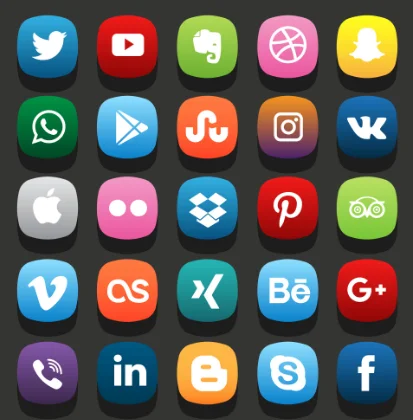
- Recently, social media is growing rapidly. Ironically, its use in remote areas has remained relatively low.
- Social media has revolutionized communication but it is evenly killing it by limiting face-to-face communication.
- Identically, social media has helped make work easier. However,at the same time it is promoting laziness and irresponsibility in society today.
- The widespread use of social media and its influence has increased desperation, anxiety, and pressure among young youths.
- Social media has made learning easier but its addiction can lead to bad grades among university students.
- As a matter of fact, social media is contributing to the downfall of mainstream media. Many advertisements and news are accessed on social media platforms today.
- Social media is a major promoter of immorality in society today with many platforms allowing sharing of inappropriate content.
- Significantly, social media promotes copycat syndrome that positively and negatively impacts the behavior adapted by different users.
- In this affluent era, social media has made life easy but consequently affects productivity and physical strength.
- The growth of social media and its ability to reach more people increases growth in today’s business world.
- The freedom on social media platforms is working against society with the recent increase in hate speech and racism.
- Lack of proper verification when signing up on social media platforms has increased the number of minors using social media exposing them to cyberbullying and inappropriate content.
- The freedom of posting anything on social media has landed many in trouble making the need to be cautious before posting anything important.
- The widespread use of social media has contributed to the rise of insecurity in urban centers
- Magazines and journals have spearheaded the appreciation of all body types but social media has increased the rate of body shaming in America.
- To stop abuse on Facebook and Twitter the owners of these social media platforms must track any abusive post and upload and ban the users from accessing the apps.
- Social media benefits marketing by creating brand recognition, increasing sales, and measuring success with analytics by tracking data.
- Social media connects people around the globe and fosters new relationships and the sharing of ideas that did not exist before its inception.
- The increased use of social media has led to the creation of business opportunities for people through social networking, particularly as social media influencers.
- Learning is convenient through social media as students can connect with education systems and learning groups that make learning convenient.
- With most people spending most of their free time glued to social media, quality time with family reduces leading to distance relationships and reduced love and closeness.

- Write my thesis
- Thesis writers
- Buy thesis papers
- Bachelor thesis
- Master's thesis
- Thesis editing services
- Thesis proofreading services
- Buy a thesis online
- Write my dissertation
- Dissertation proposal help
- Pay for dissertation
- Custom dissertation
- Dissertation help online
- Buy dissertation online
- Cheap dissertation
- Dissertation editing services
- Write my research paper
- Buy research paper online
- Pay for research paper
- Research paper help
- Order research paper
- Custom research paper
- Cheap research paper
- Research papers for sale
- Thesis subjects
- How It Works
How to Write a Thesis Statement About Social Media

Writing a thesis statement requires good research and creating a concise yet very informative point. Writing one about social media is no different. Due to the scope of the study, the information to gather and discuss is even more expansive.
- What is a Social Media Thesis Statement?
Social Media Essay Outline
Social media essay titles, thesis on social media, argumentative essay on social media, social networking thesis statement, summing up the thesis statement.
Social media uses mobile technologies that are Internet-based to run communication across different parts of the world. It gives people worldwide the opportunity to communicate and socialize, unlike past means of communication which were only one-way.
The evolution of technology has made social media more efficient and prevalent than any other form of communication today. With technology’s continued evolution, social media will continue to evolve, and so will topics and thesis statements about it. A good thesis statement about social media must meet some requirements, and we will look through most of them.
What is a Social Media Thesis Statement Supposed to Look Like?
Before understanding how a thesis statement on social media should look like, we should familiarize ourselves with what thesis statements properly entail. A thesis statement is typically written in the introductory portion of a paper.
It provides an apt and rapid summary of the main point or aim of the research paper or thesis. As the name implies, it is a statement, mainly written in just one sentence.
A thesis statement briefly combines the topic and the main ideas of the paper. Usually, there are two types of thesis statements: indirect and direct. The indirect thesis statements do not mention the core areas or reason of the thesis like the direct statement does.
A direct statement mentions the main topic and discusses the reasons for the paper, while an indirect statement mentions the statement and points out three reasons for it.
For instance, an indirect social media thesis statement could go like this; “Effects of social media on youth and the reasons for its abuse.” Here the topic is clearly stated, along with the central claim of the thesis paper.
Thesis statements are created, backed up, and expatiated in the remaining parts of the paper by citing examples and bringing up other related topics that support their claim. Through this, the thesis statement then goes to help structure and develop the entire body of the writing piece.
A thesis about social media should contain a good thesis statement that would impact and organize the body of the thesis work. Thesis statements do not necessarily control the entire essay but complement it in numerous aspects.
In writing a social media essay, there is a wide variety of topics to talk about. The points are nearly endless, from information collection to technology, its impacts, and adverse effects to its evolution. Nevertheless, there is always a basic outline for an essay, and it will be structured to follow the same format.
Here is an outline for a social media essay;
- Introduction
Here, you begin with the topic, state its objective, provide reasons to support its claims and finalize with a precise and accurate thesis statement.
- Thesis statement
This statement should support and complement your main topic of discussion. It should provide a concise and cut-out message of the essay.
This section systematically lays out the arguments to support your topic while splitting them into paragraphs. This will gradually develop your points in a structured manner.
Each paragraph in this section must start with the topic sentence which relates directly to the thesis statement. Naturally, a paragraph should focus on one idea and be connected to the essay’s central argument.
Students must also conduct research and provide evidence to support the claims presented in the topic sentence. They can achieve this by using proper explanation methods to merge all their findings carefully.
In the conclusion of the social media essay , you restate your statement in a way that completely complements and brings all your previous arguments together. It must have a concluding paragraph that reiterates the main point discussed in the body of the content. It should also add a call to action to bring the essay into a logical closure that effortlessly lays bare all the ideas previously presented.
The social media field is continuously expanding, and there are various variations to how it can be operated and observed. Choosing a topic is easy, but choosing the right one may not be as unchallenging.
Before you begin writing an essay, the correct approach will be to review as many samples as you can. This way, you can easily understand the general concept and the adequate writing flow required to outline or develop your arguments carefully.
Picking the wrong titles can go on to make your thesis for a social media essay unnecessarily tricky to write. This can occur when you pick a topic too complex or choose one too vaguely and undervalued. This could make you get stuck when writing, so you should always pick titles that are easy to research, analyze and expand upon.
With all these in view, here are some social media essay titles;
- Impact of social media on general education
- Effects of using social media on businesses
- Adverse effects of social media on personal relationships
- The effect of government on social media and their potential restrictions
- How a thesis about the effects of social media can positively impact society.
A thesis on social media should easily resemble other academic papers and concentrate on various topics in various subjects. Papers like this should take social media as their primary focus.
Keeping that in mind, a compelling social media thesis should contain specific parts like an introduction, thesis statement, body, and conclusion. Each part is essential and has its contribution and functions to the entire content of the thesis. Some students may find writing a thesis statement about social media difficult, so you can always ask our professional writers to “ write my thesis ” and we will be happy to help you.
The introduction usually contains a hook, a summary of the core points, and a concise thesis statement. The body section must carefully develop each argument and idea in a paragraph, while the conclusion should completely close all the arguments.
The tone, style, and approach to each argument should be precise and well laid out to quickly understand the general idea the thesis is trying to build upon. Depending on the level of education you are writing your thesis, you may need to conduct specific direct research on some points and be required to portray them in an encompassing manner.
Generally, thesis writing on any topic requires hard work, extensive research periods, and a good understanding of writing methods. Hence it should be approached with determination and passion. As a student in higher education, you should learn how to improve your writing skills.
An argumentative essay on social media is typically more engaging with active points of discussion and analysis. Communication is an integral aspect of human life when connecting and moving society as a whole forward. Now technology has upgraded communication to a social media age, which has become an advantage and disadvantage in many aspects of life.
An argumentative social media essay generally possesses a strong argument. The essay’s topic must be designed to prompt a person to pick a side or a discussion and provide the necessary support to back up their decision. This type of essay also requires one to research accurate facts for proper argumentative purposes.
Social media argumentative essays target the harmful effects of this brilliant innovation in communication and its uses worldwide. It is only natural as negative discussions might elicit a sense of debate and argumentation. Some examples of argumentative essay topics on social media include;
- The negative effects of social media on education in different nations
- Effects of social media and its impacts on the older and younger generation
- How social media has taken over people
- The adverse effects of social media and the digital space on our mental health
- The pros and cons of social media in this society.
Social networking is an integral aspect of social media. It uses Internet-based social media sites to create connections and stay connected with friends, customers, family, and even business partners.
Social networking usually performs a primary purpose in communication with actual avenues like Twitter, Instagram, Facebook, and LinkedIn. These sites and applications enable people to connect to develop relationships and share messages, ideas, and information.
Most social networking forms entail developing and maintaining relationships using communication technology, whether it is the relationship between clients, business partners, or even students.
For example, with the development of the Internet, most students can easily find services to help write dissertations on media space, or social media marketing. All you have to do is invite me to write my dissertation and they will immediately find the best service to solve their problem.
Writing is a social networking thesis statement similar to that of a social media thesis statement. They essentially involve rational discussion, and they can be approached in the same manner. The only slight difference will be the particular attention to social media relationships. How they are developed, what it takes to maintain them, and the various merits they could provide. These would typically form the structure of a social networking thesis statement.
Writing a good thesis statement on social media involves a good understanding of the topic chosen and an accurate idea of the reasons, factors, and discussions that impact the main idea of the thesis. With all these discussed, you should be well on your way to writing good thesis statements on social media.
Most Popular
13 days ago
How Learning Artificial Intelligence in School Can Secure Future Jobs
12 days ago
Whose vs Who’s
Were ninjas real, it’s vs its, how to cite a report, social media & society thesis statement examples.
unsplash.com

Social Media & Society is a captivating and relevant research area, encompassing various aspects from interpersonal relations to global communication dynamics. A well-defined thesis statement is pivotal for delineating your research parameters and objectives in this expansive field. Below, you’ll find insightful examples of both good and bad thesis statements on Social Media & Society, accompanied by comprehensive explanations.
Good Thesis Statement Examples
Good: “This thesis evaluates the correlation between prolonged social media usage and increased levels of anxiety and depression among teenagers in the United States.” Bad: “Social media affects teenagers’ mental health.”
The good statement presents a specific correlation, target demographic (teenagers in the U.S.), and identified outcomes (anxiety and depression levels). The bad example, while correct, is vague and lacks defined variables and demographic focus.
Good: “The proliferation of fake news on social media platforms has discernibly influenced political elections, swaying public opinion and voter behavior.” Bad: “Fake news on social media impacts elections.”
The good statement provides a clear, arguable claim regarding fake news, public opinion, and voter behavior on social media. Conversely, the bad example states a general fact without depth or a specific area of impact.
Good: “Implementing educational programs that promote critical digital literacy can mitigate the negative effects of cyberbullying among middle school students.” Bad: “Education can help reduce cyberbullying.”
The good example is researchable and offers specific solutions (critical digital literacy programs), target demographic (middle school students), and defined problem (cyberbullying). The bad statement lacks detail, specific solutions, and target groups.
Bad Thesis Statement Examples
Overly Broad: “Social media has changed the way people communicate.”
Although true, this statement is excessively general and does not specify which aspect of communication or which demographic is being explored.
Lack of Clear Argument: “Social media is popular among young people.”
While factual, this statement lacks a clear argument or specific research focus, rendering it ineffective as a research guide.
Unmeasurable and Unresearchable: “Life is unimaginable without social media today.”
Although many might agree, this statement is not easily measurable or researchable and does not provide clear directions for academic exploration.
Crafting a compelling thesis statement for research in social media and society is crucial for delineating your investigation and elucidating your academic endeavor’s aims and scope. A good thesis statement should be specific, debatable, and researchable, acting as a sturdy foundation for scholarly inquiry. In contrast, a bad thesis statement is often too general, lacks a clear argument, and is not conducive to empirical exploration. The examples and analyses provided in this guide furnish students with valuable insights for developing thesis statements that are academically rigorous and insightful for exploring the intricate relationship between social media and society.
Follow us on Reddit for more insights and updates.
Comments (0)
Welcome to A*Help comments!
We’re all about debate and discussion at A*Help.
We value the diverse opinions of users, so you may find points of view that you don’t agree with. And that’s cool. However, there are certain things we’re not OK with: attempts to manipulate our data in any way, for example, or the posting of discriminative, offensive, hateful, or disparaging material.
Cancel reply
Your email address will not be published. Required fields are marked *
Save my name, email, and website in this browser for the next time I comment.
More from Thesis Statement Examples and Samples

Sep 30 2023
Gender & Sexuality Studies Thesis Statement Examples

Criminal Justice Reform Thesis Statement Examples

Sustainable Development Goals (SDGs) Thesis Statement Examples
Remember Me
What is your profession ? Student Teacher Writer Other
Forgotten Password?
Username or Email
404 Not found

Crafting A Thesis Statement About Social Media: Tips And Tricks
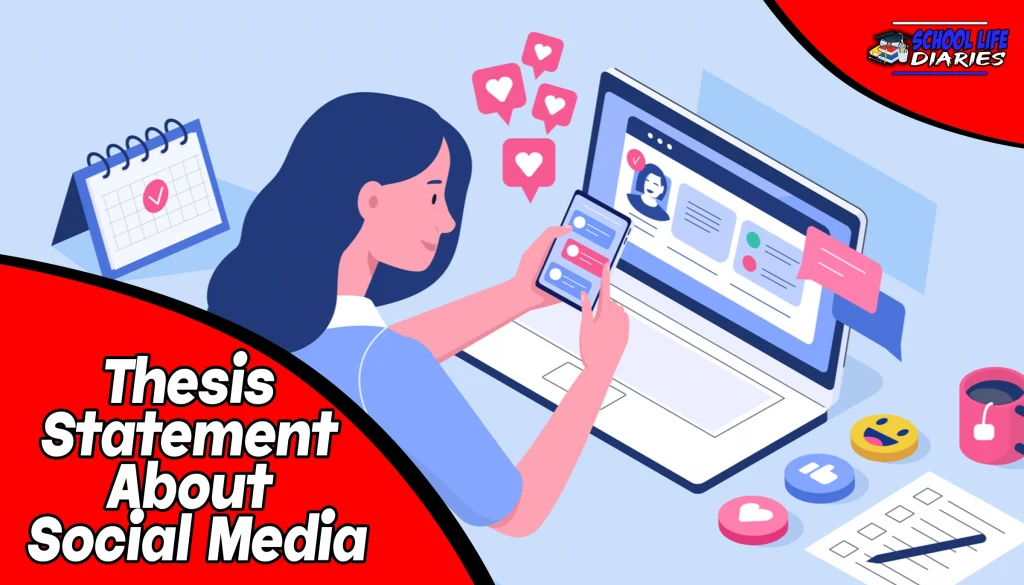
With the rise of online platforms and thesis statement social media in our lives, students and teachers alike are increasingly asking questions about whether or not this technology is beneficial to academic performance. While it can be argued that there are both pros and cons to using social media. Many studies now show how integrating different forms of social media into classroom-based teaching can have tremendous positive benefits such as promoting greater collaboration between peers.
Asynchronous learning opportunities for a wider variety of topics, increased engagement among students to participate in activities related to areas of study, improved access to resources outside the textbook, as well as an overall boost in communication with all stakeholders involved within any given educational setting. In this blog post, we will explore these topics and provide a thesis statement about the impacts that social media has today on modern education.
How To Write a Thesis Statement About Social Media?
1. understand the topic:.
Before attempting to write a thesis statement on social media, it is important to understand the topic. In this case, you need to familiarize yourself with what social media is and what aspects are associated with it. Researching different sources such as news articles, blogs, and academic papers can help provide insight into the topic.
2. Brainstorm Potential Ideas:
After gaining an understanding of the topic, you should brainstorm potential ideas for your thesis statement. Think about what information you found during your research and develop a few statements that capture the essence of it. It is also useful to consider any questions or opinions you have on the subject matter.
3. Refine the Ideas:
Once you have a few potential ideas for your thesis statement, it is time to narrow them down. Evaluate each idea and determine which one best encapsulates the points you want to make about social media. Re-write this statement in its strongest form and consider how it can be further refined.
4. Finalize Your Thesis Statement:
After you have thoroughly examined each idea, you can finalize your thesis statement. Make sure it accurately reflects the points you want to make about social media and that it is written in a clear and concise manner. Once this is done, your thesis statement on social media will be complete.
5. Support Your Thesis Statement:
To make your thesis statement even stronger, it is important to provide evidence and support for your claims. This may involve conducting additional research or gathering statistics that back up what you are saying. Doing this will create a well-rounded argument and help communicate the message of the thesis statement more effectively.
6. Revise and Edit:
The final step in writing your thesis statement is to revise and edit it. Read through the statement several times, paying attention to spelling, grammar, and syntax. You can also ask someone else to read over it as well to ensure that it is clear and accurate. Once everything has been checked, your thesis statement on social media is ready to be presented.
What Is a Social Media Thesis Statement?
A Social Media Thesis Statement is a statement that expresses the key idea of an argument about the influence of social media platforms on modern society. It could be argued that social media has had both positive and negative impacts on people, from creating new opportunities for communication and connection to contributing to issues like cyberbullying, addiction, and data security.
The overall effect of social media on our lives is still unclear and needs further exploration. This thesis statement serves as a starting point for further research into the role of social media in today’s society. Through exploring the effects of social media on individuals, communities, and even global society, we can gain insight into how these platforms are shaping the world we live in.
What Are Social Networks On The Internet?
Social networks on the Internet are online platforms that allow individuals to connect and interact with one another in a virtual space. These networks often involve user profiles, friends lists, and other features that allow users to post content such as photos, text, and videos. Many social networks allow users to comment on others’ posts, join groups, and join conversations.
The use of social networks has become a popular part of everyday life, providing users with a convenient way to stay connected and share information. From personal connections to professional opportunities, these networks offer various benefits that can be utilized by both individuals and businesses.
Do We Know Where Social Networks Originate?
Social networks have become an increasingly popular way of connecting with people all over the world, allowing us to communicate with friends, family, and acquaintances. However, it can be difficult to determine the exact origin of these networks.
The first concept resembling a social network was Six Degrees, which was created by Andrew Weinreich in 1996. This website allowed users to create a profile and connect with other users, as well as find people from around the world. It was successful for a while but eventually failed due to legal issues and a lack of funding.
In 1997, Classmates.com was launched, allowing users to search for former classmates and make connections with them. This was the beginning of social networks becoming an integral part of our lives. Soon after, other popular networks emerged such as Friendster in 2002, LinkedIn in 2003, and MySpace in 2004.
Advantages and Disadvantages of Social Networks On The Internet
Advantages of social networks on the internet.
1. Social networks on the internet provide unprecedented levels of connectivity, allowing users to easily interact with each other regardless of geographical location.
2. Social networks can be used to build communities and create conversations around particular topics or ideas.
3. Many social networks have also opened up their platforms to entrepreneurs, allowing small businesses to have the opportunity to market their products and services more effectively.
4. While social networks do offer many benefits, it is important that users remain cautious when using them.
5. Social networks can provide many opportunities for people to make connections, learn about new topics, and gain insight into different perspectives.
Disadvantages of Social Networks On The Internet
1. Excessive personal information sharing can lead to identity theft and fraud.
2. Unregulated content can be misleading or inappropriate for younger viewers.
3. Connecting with strangers online can put users at risk for cyberbullying, scams, and other malicious acts.
4. Increased distractions from social media use can negatively impact school performance and work productivity.
5. Addiction to social networking sites is common among users, leading to a lack of balance between online/offline relationships and activities.
How To Write A Good Social Media Essay?
1. Choose a topic that interests you and your audience
2. Do extensive research to understand the subject better
3. Brainstorm ideas
4. Outline the essay structure
5. Write an attention-grabbing introduction
6. Create well-structured paragraphs with clear arguments supported by evidence
7. Incorporate visuals (e.g., images, videos, gifs) where appropriate to keep readers engaged
8. Make sure your content is relevant and up-to-date according to social media trends
9. End with a strong conclusion summarizing the main points
10. Proofread for grammar and formatting errors before posting.
Social Media Essay Outline
1. introduction:.
The introduction should provide a brief overview of the topic, explaining what social media is and why it is important in our lives today. It should also introduce the main points to be discussed in the essay and provide an overview of relevant research that has been done. The Introduction should conclude with a clearly defined thesis statement.
2. Thesis Statement:
The purpose of this essay is to explore the effects that social media has had on our lives, both positive and negative, and to provide insight into how we can use it in constructive ways.
The body of the essay should begin by looking at the positives of social media, such as its ability to connect people across the globe and how it can be used to share ideas. It should discuss how social media has created new opportunities for businesses and organizations to reach a wider audience and how it can be used to raise awareness about important issues.
4. Conclusion:
In conclusion, although there are both positives and negatives associated with social media, it is clear that used in the right way it can be an incredibly useful and powerful tool for communication. With a few simple steps, such as using proper caution when consuming information and taking breaks from constant use, anyone can enjoy the benefits of this technology without many of its potential drawbacks.
21 Examples of Thesis Statements About Social Media
1. For individuals, social media can be both a blessing and a curse; it provides a platform for increased connectivity, but can also create or exacerbate feelings of loneliness and depression.
2. Social media has been associated with the rise of “echo chambers” that limit the diversity of perspectives people encounter.
3. Social media can also have a serious impact on mental health, as users are exposed to a barrage of both positive and negative information all at once.
4. It is important for individuals to be conscious of their own use of social media, as well as that of others in order to minimize any potential risks associated with it.
5. Setting limits on time spent online, engaging in meaningful conversations, and taking a break from social media can help to reduce any potential negative effects of its use.
6. It is also important to remember that the content posted on social media does not always reflect the reality of people’s lives.
7. It is crucial to remain mindful of what we see on social media and understand its potential impact on our own mental health.
8. We can ensure a safe and healthy online environment for ourselves and those around us.
9. Social media can be an amazing tool to maintain relationships and foster meaningful dialogue, but it is important to keep in mind the potential pitfalls associated with its use.
10. We can make sure that our experiences on social media are both positive and productive.
11. By understanding the potential risks and actively managing our own use of social media, we can ensure that it remains a force for good in our lives.
12. Through increased self-awareness and mindfulness, we can make sure to get the most out of our interactions on social media while avoiding any potential negative effects.
13. It is important to remember that social media should use in moderation and with care so that it can continue to have a positive impact on the lives of its users.
14. By remaining aware of our own use and encouraging others to do the same, we can ensure that social media remains a safe and healthy space for all.
15. It is important to remember the potential benefits and pitfalls of social media and make sure to use it responsibly.
16. We can ensure a safe and enjoyable experience for everyone who uses it
17. Social media can also be a powerful tool for spreading awareness and promoting positive change in the world.
18. Social media can use to advocate for causes that matter and amplify the voices of those who are often unheard.
19. Through thoughtful engagement and meaningful conversations, we can use social media as a platform to create positive change in the world.
20. When used responsibly, social media can be an invaluable tool to help us build better communities and create a more just and equitable world.
21. By understanding the potential impacts of using social media and taking steps to ensure responsible use, we can make sure that it remains a force for good in our lives.
Related Article: Term Paper: Structure And Tips For Writing A Successful Paper
Conclusion:
As we can see from this study, students who use social media in an educational setting perform better than those who don’t. This is likely because social media provides a more engaging and interactive learning environment. While there are many potential benefits to incorporating social media into instruction, such as promoting collaboration and interaction among students.
There are also some challenges that need to take into account, such as managing student screen time and ensuring online safety. If you’re a teacher, consider incorporating social media into your lesson plans. And if you’re a student, be sure to take advantage of the resources that social media has to offer.
Related Posts

A Complete Parent Guide for Setting Up Google Classroom

Master the Art of Grading in Google Classroom: Ultimate Guide
Leave a comment cancel reply.
Your email address will not be published. Required fields are marked *
Save my name, email, and website in this browser for the next time I comment.
School Life Diaries
Our website provides interesting and informative content related to school life, teachers, and students. Our articles are written by experienced professionals and provide valuable insights into the world of education.
Whether you’re a student looking for advice or a teacher searching for new ideas, our website is a great resource for anyone interested in learning more about the school experience.
- Teachers Tote
Legal Pages
- Privacy Policy
- Terms of Use
Social Media


Thesis Statements
What this handout is about.
This handout describes what a thesis statement is, how thesis statements work in your writing, and how you can craft or refine one for your draft.
Introduction
Writing in college often takes the form of persuasion—convincing others that you have an interesting, logical point of view on the subject you are studying. Persuasion is a skill you practice regularly in your daily life. You persuade your roommate to clean up, your parents to let you borrow the car, your friend to vote for your favorite candidate or policy. In college, course assignments often ask you to make a persuasive case in writing. You are asked to convince your reader of your point of view. This form of persuasion, often called academic argument, follows a predictable pattern in writing. After a brief introduction of your topic, you state your point of view on the topic directly and often in one sentence. This sentence is the thesis statement, and it serves as a summary of the argument you’ll make in the rest of your paper.
What is a thesis statement?
A thesis statement:
- tells the reader how you will interpret the significance of the subject matter under discussion.
- is a road map for the paper; in other words, it tells the reader what to expect from the rest of the paper.
- directly answers the question asked of you. A thesis is an interpretation of a question or subject, not the subject itself. The subject, or topic, of an essay might be World War II or Moby Dick; a thesis must then offer a way to understand the war or the novel.
- makes a claim that others might dispute.
- is usually a single sentence near the beginning of your paper (most often, at the end of the first paragraph) that presents your argument to the reader. The rest of the paper, the body of the essay, gathers and organizes evidence that will persuade the reader of the logic of your interpretation.
If your assignment asks you to take a position or develop a claim about a subject, you may need to convey that position or claim in a thesis statement near the beginning of your draft. The assignment may not explicitly state that you need a thesis statement because your instructor may assume you will include one. When in doubt, ask your instructor if the assignment requires a thesis statement. When an assignment asks you to analyze, to interpret, to compare and contrast, to demonstrate cause and effect, or to take a stand on an issue, it is likely that you are being asked to develop a thesis and to support it persuasively. (Check out our handout on understanding assignments for more information.)
How do I create a thesis?
A thesis is the result of a lengthy thinking process. Formulating a thesis is not the first thing you do after reading an essay assignment. Before you develop an argument on any topic, you have to collect and organize evidence, look for possible relationships between known facts (such as surprising contrasts or similarities), and think about the significance of these relationships. Once you do this thinking, you will probably have a “working thesis” that presents a basic or main idea and an argument that you think you can support with evidence. Both the argument and your thesis are likely to need adjustment along the way.
Writers use all kinds of techniques to stimulate their thinking and to help them clarify relationships or comprehend the broader significance of a topic and arrive at a thesis statement. For more ideas on how to get started, see our handout on brainstorming .
How do I know if my thesis is strong?
If there’s time, run it by your instructor or make an appointment at the Writing Center to get some feedback. Even if you do not have time to get advice elsewhere, you can do some thesis evaluation of your own. When reviewing your first draft and its working thesis, ask yourself the following :
- Do I answer the question? Re-reading the question prompt after constructing a working thesis can help you fix an argument that misses the focus of the question. If the prompt isn’t phrased as a question, try to rephrase it. For example, “Discuss the effect of X on Y” can be rephrased as “What is the effect of X on Y?”
- Have I taken a position that others might challenge or oppose? If your thesis simply states facts that no one would, or even could, disagree with, it’s possible that you are simply providing a summary, rather than making an argument.
- Is my thesis statement specific enough? Thesis statements that are too vague often do not have a strong argument. If your thesis contains words like “good” or “successful,” see if you could be more specific: why is something “good”; what specifically makes something “successful”?
- Does my thesis pass the “So what?” test? If a reader’s first response is likely to be “So what?” then you need to clarify, to forge a relationship, or to connect to a larger issue.
- Does my essay support my thesis specifically and without wandering? If your thesis and the body of your essay do not seem to go together, one of them has to change. It’s okay to change your working thesis to reflect things you have figured out in the course of writing your paper. Remember, always reassess and revise your writing as necessary.
- Does my thesis pass the “how and why?” test? If a reader’s first response is “how?” or “why?” your thesis may be too open-ended and lack guidance for the reader. See what you can add to give the reader a better take on your position right from the beginning.
Suppose you are taking a course on contemporary communication, and the instructor hands out the following essay assignment: “Discuss the impact of social media on public awareness.” Looking back at your notes, you might start with this working thesis:
Social media impacts public awareness in both positive and negative ways.
You can use the questions above to help you revise this general statement into a stronger thesis.
- Do I answer the question? You can analyze this if you rephrase “discuss the impact” as “what is the impact?” This way, you can see that you’ve answered the question only very generally with the vague “positive and negative ways.”
- Have I taken a position that others might challenge or oppose? Not likely. Only people who maintain that social media has a solely positive or solely negative impact could disagree.
- Is my thesis statement specific enough? No. What are the positive effects? What are the negative effects?
- Does my thesis pass the “how and why?” test? No. Why are they positive? How are they positive? What are their causes? Why are they negative? How are they negative? What are their causes?
- Does my thesis pass the “So what?” test? No. Why should anyone care about the positive and/or negative impact of social media?
After thinking about your answers to these questions, you decide to focus on the one impact you feel strongly about and have strong evidence for:
Because not every voice on social media is reliable, people have become much more critical consumers of information, and thus, more informed voters.
This version is a much stronger thesis! It answers the question, takes a specific position that others can challenge, and it gives a sense of why it matters.
Let’s try another. Suppose your literature professor hands out the following assignment in a class on the American novel: Write an analysis of some aspect of Mark Twain’s novel Huckleberry Finn. “This will be easy,” you think. “I loved Huckleberry Finn!” You grab a pad of paper and write:
Mark Twain’s Huckleberry Finn is a great American novel.
You begin to analyze your thesis:
- Do I answer the question? No. The prompt asks you to analyze some aspect of the novel. Your working thesis is a statement of general appreciation for the entire novel.
Think about aspects of the novel that are important to its structure or meaning—for example, the role of storytelling, the contrasting scenes between the shore and the river, or the relationships between adults and children. Now you write:
In Huckleberry Finn, Mark Twain develops a contrast between life on the river and life on the shore.
- Do I answer the question? Yes!
- Have I taken a position that others might challenge or oppose? Not really. This contrast is well-known and accepted.
- Is my thesis statement specific enough? It’s getting there–you have highlighted an important aspect of the novel for investigation. However, it’s still not clear what your analysis will reveal.
- Does my thesis pass the “how and why?” test? Not yet. Compare scenes from the book and see what you discover. Free write, make lists, jot down Huck’s actions and reactions and anything else that seems interesting.
- Does my thesis pass the “So what?” test? What’s the point of this contrast? What does it signify?”
After examining the evidence and considering your own insights, you write:
Through its contrasting river and shore scenes, Twain’s Huckleberry Finn suggests that to find the true expression of American democratic ideals, one must leave “civilized” society and go back to nature.
This final thesis statement presents an interpretation of a literary work based on an analysis of its content. Of course, for the essay itself to be successful, you must now present evidence from the novel that will convince the reader of your interpretation.
Works consulted
We consulted these works while writing this handout. This is not a comprehensive list of resources on the handout’s topic, and we encourage you to do your own research to find additional publications. Please do not use this list as a model for the format of your own reference list, as it may not match the citation style you are using. For guidance on formatting citations, please see the UNC Libraries citation tutorial . We revise these tips periodically and welcome feedback.
Anson, Chris M., and Robert A. Schwegler. 2010. The Longman Handbook for Writers and Readers , 6th ed. New York: Longman.
Lunsford, Andrea A. 2015. The St. Martin’s Handbook , 8th ed. Boston: Bedford/St Martin’s.
Ramage, John D., John C. Bean, and June Johnson. 2018. The Allyn & Bacon Guide to Writing , 8th ed. New York: Pearson.
Ruszkiewicz, John J., Christy Friend, Daniel Seward, and Maxine Hairston. 2010. The Scott, Foresman Handbook for Writers , 9th ed. Boston: Pearson Education.
You may reproduce it for non-commercial use if you use the entire handout and attribute the source: The Writing Center, University of North Carolina at Chapel Hill
Make a Gift
Social Media Essay: Benefits and Drawbacks of Social Networking Sites
The advent of various social media channels has revolutionized the internet landscape by introducing us to global networking. Today, an individual can connect with another in a completely different part of this world just in a matter of seconds. We will take you through various notions and opinions associated with social media and how they impact our everyday lives. Also, there are some incredible tips to give you a better insight into how to write a social media essay.

Sep 03 2020 ● 8 min read

Table of Contents
What is social media essay, how do you write a social media essay, structure of social media essay, various tones of a social media essay, incorporate an attractive topic.
As you know, an social media essay is a piece of writing that is used to introduce an essential topic to the world with its underlying advantages and disadvantages. These aspects are driven solely by facts and should not contain the opinions of the writers. It is drafted to give others a better understanding of the subject in hand.
No matter which subject it pertains to, an essay ends with a conclusion where the writers are permitted to give their opinion after weighing the advantages and disadvantages.
Similarly, a social media essay is written to appreciate the positive aspects and highlight the negative impacts of social media in this time and day. The conclusions include the analysis of the two elements by the writers in their own lives and give an open-ended point of view. Depending upon the essay writer or paper writing service , the decision can be decisive, too, but that is not encouraged.
Today, the use of social networks, whether it is Facebook, Twitter, Snapchat, Instagram, or LinkedIn, has increased exponentially. An average millennial spends 2 hours and 58 minutes per day on social media platforms like Facebook. While some say that the platform is super-informative, others argue that all the information gathered on this platform is trivial and doesn't justify long hours invested in the use of social media.
The above arguments make using social media by individuals with a debatable issue, and this is why a lot of students are required to write an essay on social media. So, here are some incredible tips to help you out in writing an essay on social media even if you don't have marketing skills .
A classic essay consists of 3 parts – the introduction, main body, and the conclusion.
- The Introduction
As you introduce the main topic, always begin with how it is relevant to the current scenario. You can do this by providing some background information. The information can be made richer by adding some reliable stats and data . Once you have established the topic, you need to give a strong thesis statement of the hypothesis on which your essay is based.
The thesis statement in your essay should be precise and debatable. If not, the arguments that you are going to put forward in the essay would make no sense.
The main body of your text should consist of logical arguments in relevance to your hypothesis. Make sure you put forward one statement in one paragraph and start a new one with another section. This will make your essay look more organized.
Also, when developing ideas, only include the ones you can write clearly about. If not, avoid them. Make sure that the essay develops coherently.
To conclude the essay about social media, bring back your hypothesis, and state how the aspects you discussed earlier support or nullify it. Make it a point to summarize all ideas, but do not start adding more ideas when you are about to conclude. You can now give an, ideally, open end to your essay.
A great conclusion is the one that provokes thought and will make your readers question the use of social media in their everyday lives.
Also, remember that essays do not have to include pros and cons always. They can either be full of pros or cons or both, depending upon your hypothesis. Just ensure they are relevant.
You might believe that an essay is an essay, and two of them would be similar, but that's a misconception. Different essays have varying tones depending on how the author is treating the thesis statement through the main body of the text. Here are a few examples of essays on social media in different tones.
- Sample of a Persuasive Essay
If you are asked to write an academic paper about the effects of social media on the mental health of teenagers and young adults, you should make it persuasive. For this, just writing about the topic is not enough. It would help if you had an impactful thesis, followed by powerful arguments to support or question your theory.
The perils associated with social media addiction are forcing parents and "grown-ups" to throw their benefits in bad light today. In the race to become best in academics and non-academic activities, people are losing their grip on how social networks bring people together. They empower individuals with knowledge about various cultures and languages, which might not have been possible otherwise.
Social media sites can be addictive, and students might waste their formative years scrolling through the trivial feed and gain nothing but superficial knowledge. But that is just because neither parents nor the school is encouraging positive social media behavior. If these institutions start offering tips to students to limit and utilize their time on social media , one would be amazed to see their achievements.
Is social media a catalyst for the downfall of student life? Well, social media sites like Facebook, YouTube, Twitter, Instagram, and more are teeming with inspirational achievers and content creators who go the extra mile to share their stories and inspire students. If the children are taught to see their access to social media as an opportunity to grow rather than a competition for likes and followers, they are bound to work harder and achieve goals that seemed insurmountable earlier.
- Sample of Negative Essay about social media
If you have been asked to highlight the negative aspects of social media, your teacher does not mean that you have to cross all limits to present the use of social media in a bad light. Instead, what they are asking for is some logical and believable arguments that tell us why social media is harmful to society.
Social media is destroying family links by creating a virtual shell for each individual, which dissociates them with their own parents and siblings. The kids are adversely affected by increased access to social media if parents are always indulged in their devices and ignore them. Eventually, even kids start using tools to connect to other people, ignoring their family members.
Since kids and teenagers are the most impressionable age groups, they start believing that everything that glitters on social media platforms is gold, and they become materialistic. Their lives start revolving around likes, comments, and followers/subscribers. No matter whether their minds are prepared for such exposure or not, social media exposes them to the best and the worst about this world, which might turn them into rebels. They start valuing their online friends more than their offline lives and go to unimaginable extents to keep them entertained.
So, parents and elders need to pay attention to their children and limit their social media use so that they can learn to form real relationships and values.
- Weighing the pros and cons
Another way in which you can present your social media essay is by comparing the positive and negative aspects associated with it. In such essays, the conclusion is better left open for the readers to decide their own take on social media.
One cannot argue that social media has taken the world by storm by allowing like-minded individuals to connect and share their experiences with the world. You can use these platforms to make new friends and discover the ones who have lost touch. You can talk to everyone on your friend list and share your content on these channels to become a part of the creators' community. There is no dearth for talent on social media and its admirers.
On the other hand, if you use social media sites for long stretches of time in one go, you run the risk of addiction. Gradually, a social media addict starts to build a cocoon for themselves, which they find hard to step out of. This leads to a disconnect between you and the family you already have and love. One might feel too confined yet comfortable in their space that they have no urge left to step out, pushing them towards social seclusion, or worse – depression.
When you flip the coin again, you will discover that social media has become an incredible platform for small businesses to grow and earn good profits . The grass-root companies do not have to invest much for advertising and promotion or even own an establishment. All they have to do is to create a grassroots marketing strategy for themselves, and their brand will start selling in no time!
In the end, social media is a game-changer on the World Wide Web. It allows people to connect with the virtual world with the risk of disconnecting with the real world. Then again, businesses are doing well on these platforms. There are indeed two sides to social media, one positive and another negative, and it is up to you which one you lean towards more.
- Argumentative social media essay
A challenging but equally exciting type of essay on social media you should know about is an argumentative essay. It is often written when you are tasked with altering the point of view of the reader, which is of a completely opposite belief. Here is a sample for your better understanding.
Social networks have an uncertain future with the string impression they leave on users, especially the younger generations. Parents panic with the first mention of social media sites by their children and learning about their presence on these platforms because they are afraid of cyberbullying. They do not want their children to get cat-fished by some stranger on Reddit when they are not around.
Moreover, social media platforms are the reason why several individuals are losing their confidential data every day to corporate houses. These businesses are using the information to bug users with ads about stuff they do not want to buy.
If such instances carry on, the day is not far when the government will start to keep checks on the likes of Twitter, Facebook, Instagram, and other channels. Massive surveillance will be imposed on these sites to prevent malicious minds from harming innocent teenagers physically or by hacking into their systems. So, before you get a chance to ask " have I been hacked ", know that someone is taking care of it.
Having an attractive topic for your social media essay does not mean using poetic words in it. You should have an issue relevant to the current scenario. In the process of selecting a fascinating topic, do not forget to keep it within the extents of your knowledge. If it becomes too complicated for you to write about, you will be stuck when coming up with arguments and ideas.
The perfect topic would be the one which offers good potential for research and is interesting for the readers too. Even if you present profound arguments about such topics, they should be in a logical, comprehensible, and readable format for people to understand easily.
Writing a social media essay is no cakewalk, whether you are a high-school student or university student. All you need to do is, structuralize it properly, be clear with the ideas and arguments you are planning to present, pick the tone of your essay, and began writing. Do not forget to top your essay up with a catchy topic so that your entire hard work doesn't fall flat.
Published on Sep 03 2020
Gintaras is an experienced marketing professional who is always eager to explore the most up-to-date issues in data marketing. Having worked as an SEO manager at several companies, he's a valuable addition to the Whatagraph writers' pool.

Related articles

Data analytics · 7 mins

Data Blending: Clear Insights for Data-Driven Marketing
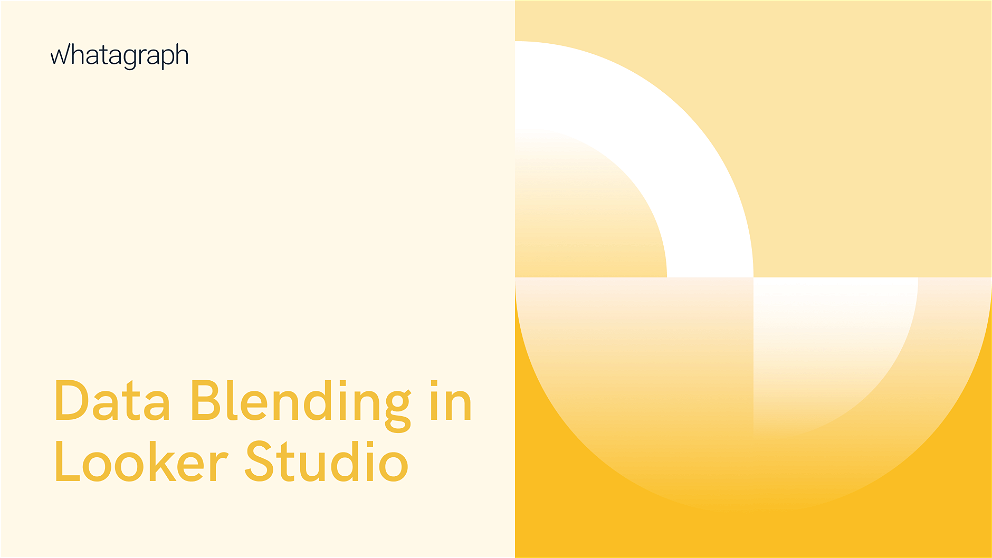
Blending Data in Looker Studio? Here’s a Faster and More Reliable Alternative

Marketing Data Transformation: How to Organize Unstructured Marketing Data?

Top 15 Data Transformation Tools for Marketers in 2024

KPIs & metrics · 7 mins
15 Inspiring TikTok Campaigns: Success Stories To Learn From
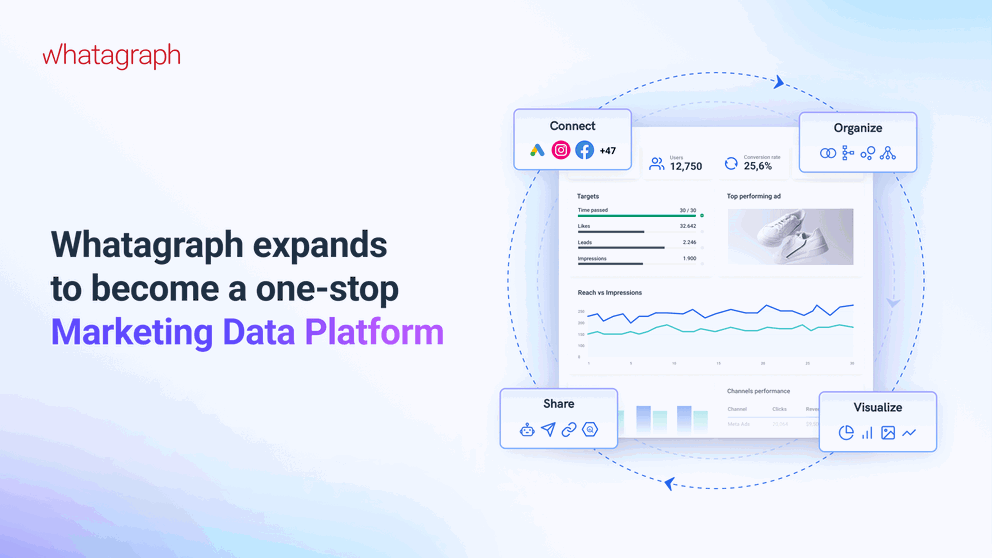
Product news · 2 mins
Whatagraph Expands to Become a One-Stop Marketing Data Platform
Get marketing insights direct to your inbox.
By submitting this form, you agree to our privacy policy
Social Media Thesis Statement: the Impact of Social Media on Mental Health
This essay will present a thesis statement on the impact of social media on mental health. It will explore how social media use correlates with issues like anxiety, depression, and self-esteem, drawing on current research and psychological theories. The piece will discuss both the negative and positive aspects of social media, considering factors such as online connectivity, cyberbullying, and the pressure of social comparison. It will also suggest directions for future research and potential solutions. PapersOwl offers a variety of free essay examples on the topic of Adolescence.
How it works
Most individuals know someone with a mental health problem or addictive behavior, but have they ever thought about where it could have risen from? The rise of anxiety and depression have been believed to drive a child’s life. Feeling driven by a motor and needing to check your phone constantly can result in negative effects. Mental health issues and addictive behaviors stem from a conglomerate of sources, but more directly, have been exasperated by social media in modern society.
- 1 Social Media, Anxiety, and the ‘Like’ Syndrome
- 2 Social Media and the Onset of Depression Symptoms
- 3 The Correlation Between Social Media Usage and Addiction
- 4 The Social Media Thesis Statement: Balancing the Scale of Positive and Negative Effects
- 5 References:
Social Media, Anxiety, and the ‘Like’ Syndrome
Mental health disorders can be one of the several negative effects given to a child by their phone.
It has been shown that anxiety is a huge factor coming from social media, “Other studies have shown that people with social anxiety prefer communicating with people via the internet rather than in person, so it would be an ideal way to initiate relationships” (Maldonado). Even some social networking environments, such as Facebook, can cause anxiety. “Recent research has shown that using social networking sites, namely Facebook, can increase people’s stress levels, produce anxiety, and negatively affect a person’s sense of self” (Maldonado). Even if people were to not look at the platforms and just focus on the ‘likes,’ problems would be found throughout. “The need to gain “likes” on social media can cause teens to make choices they would otherwise not make, including altering appearance, engaging in negative behaviors, and accepting risky social media challenges” (Hurley). As Hurley also claimed, “It’s difficult to build empathy and compassion (our best weapons in the war on bullying) when teens spend more time “engaging” online than they do in person.”
Social Media and the Onset of Depression Symptoms
Symptoms of depression are also prevalent in social media. As Hurley once said, “Though many teens know that their peers share only their highlight reels on social media, it’s very difficult to avoid making comparisons. Everything from physical appearance to life circumstances to perceived successes and failures is under a microscope on social media.” Most teenagers have gullible minds, so when they see someone more physically fit or even happier than they are, they automatically get down on themselves. Seeing somebody live a better life hurts most people, but some make the most of it by turning that into an encouraging way to get that body or make more money. Even though to some observers, it seems to be obvious that depression can also be linked to social media. According to Gordon, “Researchers are just beginning to establish a link between depression and social media.” Most say that you could have been raised with depression, which could be true, but that depression would not have flared up as much as it did once they started using these social media platforms. Even stated by a credited author, “From a mental health perspective, concerns have been raised about the negative impact of excessive use of social networking sites on the health and well-being of users, especially that of young people, who are enthusiastic users of this technology” (Griffiths). This quote proves the meaning behind the gullible minds of young ones; it can easily affect them – even causing an addiction.
The Correlation Between Social Media Usage and Addiction
As well as producing anxiety and depression, social media also has a strong link to addiction. “In a study by researchers at the UCLA brain mapping center, they found that certain regions of teen brains became activated by ‘likes’ on social media, sometimes causing them to want to use social media more” (Gordon). This statement shows just how easy it is to become addicted to posting about yourself on social media. Sometimes, this leads to teens posting pictures or captions they should not be. Obsessing over likes can lead to other impulses, such as losing sleep. “Sometimes teens spend so many hours on social media that they begin to lose valuable sleep. Consequently, thus sleep loss can lead to moodiness, a drop-in grades, and overeating, as well exacerbated existing problems like depression, anxiety, and ADD” (Gordon). This obsessive behavior also leads to problems with your brain and body since you are losing sleep time, which also means losing energy. Losing energy can cause a variety of problems, some of which include anxiety and depression. Addictive behaviors do not only just stop at losing sleep but stem all the way to using your phone while driving. “Many people’s social media use is habitual, and it can start to spill over into other areas of their lives and be problematic and dangerous, such as checking social media while driving” (Griffiths). This part of the addictive behaviors could easily be named the most atrocious. This type of behavior could easily kill or seriously harm an individual. Losing a loved one over a Facebook status shows a lot about the state that the human brain is in.
The Social Media Thesis Statement: Balancing the Scale of Positive and Negative Effects
Besides all the negative effects of social media, it also has a few positive effects on the human brain. “Although they can cause problems, these sites also have been shown to have positive effects on people. It can help psychologists monitor the mental health of patients, spread awareness about issues (including mental health disorders), connect people with one another, and make the world a little smaller” (Maldonado). Rewarding your brain with positive upbringings can really determine night or day. If someone reaches a certain level on a game or gets the reaction, they wanted on a certain post, that could easily encourage you to keep positive vibes and continue doing what they love. As Maldonado stated, “The best way for anyone to take advantage of the benefits of these sites while minimizing the downsides is to moderate his or her use and maintain a level of detachment.” Taking time away from social media would help minimize the chances of becoming depressed over a post, which could really help a teenager’s mental health.
By this time, people have probably concluded that several humans on this earth are way too attached to their phones. If people were to see someone prioritize their phone over their communication with the outside world, help them experience life as it is. If social media becomes an addiction, it could eventually lead to anxiety and depression. Even though social media has negative effects, it can also have effects that can help the human brain grow and experience positive thoughts. With that being said, most people would say social media has more negative effects than positive. The addictive behaviors and mental health issues that arise from the internet can cause several problems and become a burden in this society.
References:
- Gordon, Sherri. ‘5 Ways Social Media Affects Teen Mental Health.’ very well family, About, Inc (Dotdash), 30 July 2018, www.verywellfamily.com/ways-social-media-affects-teen-mental-health-4144769. Accessed 17 September 2018.
- Griffiths, Mark D.’ Addicted to Social Media?’ Psychology Today. Sussex Publishers, LLC, 7 May 2018, www.psychologytoday.com/us/blog/in-excess/201805/addicted-social-media. Accessed 17 September 2018.
- Hurley, Katie. ‘Social Media and Teens: How Does Social Media Affect Teenagers Mental Health.’ Psycom. Vertical Health LLC, 13 February 2018, www.psycom.net/social-media-teen-mental-health. Accessed 17 September 2018.
- Maldonado, Marissa. ‘The Anxiety of Facebook.’ Psychcentral. 16 July 2016, www.psychcentral.com/lib/the-anxiety-of-facebook/. Accessed 18 September 2018.
Cite this page
Social Media Thesis Statement: The Impact of Social Media on Mental Health. (2023, Aug 01). Retrieved from https://papersowl.com/examples/social-media-thesis-statement-the-impact-of-social-media-on-mental-health/
"Social Media Thesis Statement: The Impact of Social Media on Mental Health." PapersOwl.com , 1 Aug 2023, https://papersowl.com/examples/social-media-thesis-statement-the-impact-of-social-media-on-mental-health/
PapersOwl.com. (2023). Social Media Thesis Statement: The Impact of Social Media on Mental Health . [Online]. Available at: https://papersowl.com/examples/social-media-thesis-statement-the-impact-of-social-media-on-mental-health/ [Accessed: 1 May. 2024]
"Social Media Thesis Statement: The Impact of Social Media on Mental Health." PapersOwl.com, Aug 01, 2023. Accessed May 1, 2024. https://papersowl.com/examples/social-media-thesis-statement-the-impact-of-social-media-on-mental-health/
"Social Media Thesis Statement: The Impact of Social Media on Mental Health," PapersOwl.com , 01-Aug-2023. [Online]. Available: https://papersowl.com/examples/social-media-thesis-statement-the-impact-of-social-media-on-mental-health/. [Accessed: 1-May-2024]
PapersOwl.com. (2023). Social Media Thesis Statement: The Impact of Social Media on Mental Health . [Online]. Available at: https://papersowl.com/examples/social-media-thesis-statement-the-impact-of-social-media-on-mental-health/ [Accessed: 1-May-2024]
Don't let plagiarism ruin your grade
Hire a writer to get a unique paper crafted to your needs.

Our writers will help you fix any mistakes and get an A+!
Please check your inbox.
You can order an original essay written according to your instructions.
Trusted by over 1 million students worldwide
1. Tell Us Your Requirements
2. Pick your perfect writer
3. Get Your Paper and Pay
Hi! I'm Amy, your personal assistant!
Don't know where to start? Give me your paper requirements and I connect you to an academic expert.
short deadlines
100% Plagiarism-Free
Certified writers
Feb 15, 2023
6 Example Essays on Social Media | Advantages, Effects, and Outlines
Got an essay assignment about the effects of social media we got you covered check out our examples and outlines below.
Social media has become one of our society's most prominent ways of communication and information sharing in a very short time. It has changed how we communicate and has given us a platform to express our views and opinions and connect with others. It keeps us informed about the world around us. Social media platforms such as Facebook, Twitter, Instagram, and LinkedIn have brought individuals from all over the world together, breaking down geographical borders and fostering a genuinely global community.
However, social media comes with its difficulties. With the rise of misinformation, cyberbullying, and privacy problems, it's critical to utilize these platforms properly and be aware of the risks. Students in the academic world are frequently assigned essays about the impact of social media on numerous elements of our lives, such as relationships, politics, and culture. These essays necessitate a thorough comprehension of the subject matter, critical thinking, and the ability to synthesize and convey information clearly and succinctly.
But where do you begin? It can be challenging to know where to start with so much information available. Jenni.ai comes in handy here. Jenni.ai is an AI application built exclusively for students to help them write essays more quickly and easily. Jenni.ai provides students with inspiration and assistance on how to approach their essays with its enormous database of sample essays on a variety of themes, including social media. Jenni.ai is the solution you've been looking for if you're experiencing writer's block or need assistance getting started.
So, whether you're a student looking to better your essay writing skills or want to remain up to date on the latest social media advancements, Jenni.ai is here to help. Jenni.ai is the ideal tool for helping you write your finest essay ever, thanks to its simple design, an extensive database of example essays, and cutting-edge AI technology. So, why delay? Sign up for a free trial of Jenni.ai today and begin exploring the worlds of social networking and essay writing!
Want to learn how to write an argumentative essay? Check out these inspiring examples!
We will provide various examples of social media essays so you may get a feel for the genre.
6 Examples of Social Media Essays
Here are 6 examples of Social Media Essays:
The Impact of Social Media on Relationships and Communication
Introduction:.
The way we share information and build relationships has evolved as a direct result of the prevalence of social media in our daily lives. The influence of social media on interpersonal connections and conversation is a hot topic. Although social media has many positive effects, such as bringing people together regardless of physical proximity and making communication quicker and more accessible, it also has a dark side that can affect interpersonal connections and dialogue.
Positive Effects:
Connecting People Across Distances
One of social media's most significant benefits is its ability to connect individuals across long distances. People can use social media platforms to interact and stay in touch with friends and family far away. People can now maintain intimate relationships with those they care about, even when physically separated.
Improved Communication Speed and Efficiency
Additionally, the proliferation of social media sites has accelerated and simplified communication. Thanks to instant messaging, users can have short, timely conversations rather than lengthy ones via email. Furthermore, social media facilitates group communication, such as with classmates or employees, by providing a unified forum for such activities.
Negative Effects:
Decreased Face-to-Face Communication
The decline in in-person interaction is one of social media's most pernicious consequences on interpersonal connections and dialogue. People's reliance on digital communication over in-person contact has increased along with the popularity of social media. Face-to-face interaction has suffered as a result, which has adverse effects on interpersonal relationships and the development of social skills.
Decreased Emotional Intimacy
Another adverse effect of social media on relationships and communication is decreased emotional intimacy. Digital communication lacks the nonverbal cues and facial expressions critical in building emotional connections with others. This can make it more difficult for people to develop close and meaningful relationships, leading to increased loneliness and isolation.
Increased Conflict and Miscommunication
Finally, social media can also lead to increased conflict and miscommunication. The anonymity and distance provided by digital communication can lead to misunderstandings and hurtful comments that might not have been made face-to-face. Additionally, social media can provide a platform for cyberbullying , which can have severe consequences for the victim's mental health and well-being.
Conclusion:
In conclusion, the impact of social media on relationships and communication is a complex issue with both positive and negative effects. While social media platforms offer many benefits, such as connecting people across distances and enabling faster and more accessible communication, they also have a dark side that can negatively affect relationships and communication. It is up to individuals to use social media responsibly and to prioritize in-person communication in their relationships and interactions with others.
The Role of Social Media in the Spread of Misinformation and Fake News
Social media has revolutionized the way information is shared and disseminated. However, the ease and speed at which data can be spread on social media also make it a powerful tool for spreading misinformation and fake news. Misinformation and fake news can seriously affect public opinion, influence political decisions, and even cause harm to individuals and communities.
The Pervasiveness of Misinformation and Fake News on Social Media
Misinformation and fake news are prevalent on social media platforms, where they can spread quickly and reach a large audience. This is partly due to the way social media algorithms work, which prioritizes content likely to generate engagement, such as sensational or controversial stories. As a result, false information can spread rapidly and be widely shared before it is fact-checked or debunked.
The Influence of Social Media on Public Opinion
Social media can significantly impact public opinion, as people are likelier to believe the information they see shared by their friends and followers. This can lead to a self-reinforcing cycle, where misinformation and fake news are spread and reinforced, even in the face of evidence to the contrary.
The Challenge of Correcting Misinformation and Fake News
Correcting misinformation and fake news on social media can be a challenging task. This is partly due to the speed at which false information can spread and the difficulty of reaching the same audience exposed to the wrong information in the first place. Additionally, some individuals may be resistant to accepting correction, primarily if the incorrect information supports their beliefs or biases.
In conclusion, the function of social media in disseminating misinformation and fake news is complex and urgent. While social media has revolutionized the sharing of information, it has also made it simpler for false information to propagate and be widely believed. Individuals must be accountable for the information they share and consume, and social media firms must take measures to prevent the spread of disinformation and fake news on their platforms.
The Effects of Social Media on Mental Health and Well-Being
Social media has become an integral part of modern life, with billions of people around the world using platforms like Facebook, Instagram, and Twitter to stay connected with others and access information. However, while social media has many benefits, it can also negatively affect mental health and well-being.
Comparison and Low Self-Esteem
One of the key ways that social media can affect mental health is by promoting feelings of comparison and low self-esteem. People often present a curated version of their lives on social media, highlighting their successes and hiding their struggles. This can lead others to compare themselves unfavorably, leading to feelings of inadequacy and low self-esteem.
Cyberbullying and Online Harassment
Another way that social media can negatively impact mental health is through cyberbullying and online harassment. Social media provides a platform for anonymous individuals to harass and abuse others, leading to feelings of anxiety, fear, and depression.
Social Isolation
Despite its name, social media can also contribute to feelings of isolation. At the same time, people may have many online friends but need more meaningful in-person connections and support. This can lead to feelings of loneliness and depression.
Addiction and Overuse
Finally, social media can be addictive, leading to overuse and negatively impacting mental health and well-being. People may spend hours each day scrolling through their feeds, neglecting other important areas of their lives, such as work, family, and self-care.
In sum, social media has positive and negative consequences on one's psychological and emotional well-being. Realizing this, and taking measures like reducing one's social media use, reaching out to loved ones for help, and prioritizing one's well-being, are crucial. In addition, it's vital that social media giants take ownership of their platforms and actively encourage excellent mental health and well-being.
The Use of Social Media in Political Activism and Social Movements
Social media has recently become increasingly crucial in political action and social movements. Platforms such as Twitter, Facebook, and Instagram have given people new ways to express themselves, organize protests, and raise awareness about social and political issues.
Raising Awareness and Mobilizing Action
One of the most important uses of social media in political activity and social movements has been to raise awareness about important issues and mobilize action. Hashtags such as #MeToo and #BlackLivesMatter, for example, have brought attention to sexual harassment and racial injustice, respectively. Similarly, social media has been used to organize protests and other political actions, allowing people to band together and express themselves on a bigger scale.
Connecting with like-minded individuals
A second method in that social media has been utilized in political activity and social movements is to unite like-minded individuals. Through social media, individuals can join online groups, share knowledge and resources, and work with others to accomplish shared objectives. This has been especially significant for geographically scattered individuals or those without access to traditional means of political organizing.
Challenges and Limitations
As a vehicle for political action and social movements, social media has faced many obstacles and restrictions despite its many advantages. For instance, the propagation of misinformation and fake news on social media can impede attempts to disseminate accurate and reliable information. In addition, social media corporations have been condemned for censorship and insufficient protection of user rights.
In conclusion, social media has emerged as a potent instrument for political activism and social movements, giving voice to previously unheard communities and galvanizing support for change. Social media presents many opportunities for communication and collaboration. Still, users and institutions must be conscious of the risks and limitations of these tools to promote their responsible and productive usage.
The Potential Privacy Concerns Raised by Social Media Use and Data Collection Practices
With billions of users each day on sites like Facebook, Twitter, and Instagram, social media has ingrained itself into every aspect of our lives. While these platforms offer a straightforward method to communicate with others and exchange information, they also raise significant concerns over data collecting and privacy. This article will examine the possible privacy issues posed by social media use and data-gathering techniques.
Data Collection and Sharing
The gathering and sharing of personal data are significant privacy issues brought up by social media use. Social networking sites gather user data, including details about their relationships, hobbies, and routines. This information is made available to third-party businesses for various uses, such as marketing and advertising. This can lead to serious concerns about who has access to and uses our personal information.
Lack of Control Over Personal Information
The absence of user control over personal information is a significant privacy issue brought up by social media usage. Social media makes it challenging to limit who has access to and how data is utilized once it has been posted. Sensitive information may end up being extensively disseminated and may be used maliciously as a result.
Personalized Marketing
Social media companies utilize the information they gather about users to target them with adverts relevant to their interests and usage patterns. Although this could be useful, it might also cause consumers to worry about their privacy since they might feel that their personal information is being used without their permission. Furthermore, there are issues with the integrity of the data being used to target users and the possibility of prejudice based on individual traits.
Government Surveillance
Using social media might spark worries about government surveillance. There are significant concerns regarding privacy and free expression when governments in some nations utilize social media platforms to follow and monitor residents.
In conclusion, social media use raises significant concerns regarding data collecting and privacy. While these platforms make it easy to interact with people and exchange information, they also gather a lot of personal information, which raises questions about who may access it and how it will be used. Users should be aware of these privacy issues and take precautions to safeguard their personal information, such as exercising caution when choosing what details to disclose on social media and keeping their information sharing with other firms to a minimum.
The Ethical and Privacy Concerns Surrounding Social Media Use And Data Collection
Our use of social media to communicate with loved ones, acquire information, and even conduct business has become a crucial part of our everyday lives. The extensive use of social media does, however, raise some ethical and privacy issues that must be resolved. The influence of social media use and data collecting on user rights, the accountability of social media businesses, and the need for improved regulation are all topics that will be covered in this article.
Effect on Individual Privacy:
Social networking sites gather tons of personal data from their users, including delicate information like search history, location data, and even health data. Each user's detailed profile may be created with this data and sold to advertising or used for other reasons. Concerns regarding the privacy of personal information might arise because social media businesses can use this data to target users with customized adverts.
Additionally, individuals might need to know how much their personal information is being gathered and exploited. Data breaches or the unauthorized sharing of personal information with other parties may result in instances where sensitive information is exposed. Users should be aware of the privacy rules of social media firms and take precautions to secure their data.
Responsibility of Social Media Companies:
Social media firms should ensure that they responsibly and ethically gather and use user information. This entails establishing strong security measures to safeguard sensitive information and ensuring users are informed of what information is being collected and how it is used.
Many social media businesses, nevertheless, have come under fire for not upholding these obligations. For instance, the Cambridge Analytica incident highlighted how Facebook users' personal information was exploited for political objectives without their knowledge. This demonstrates the necessity of social media corporations being held responsible for their deeds and ensuring that they are safeguarding the security and privacy of their users.
Better Regulation Is Needed
There is a need for tighter regulation in this field, given the effect, social media has on individual privacy as well as the obligations of social media firms. The creation of laws and regulations that ensure social media companies are gathering and using user information ethically and responsibly, as well as making sure users are aware of their rights and have the ability to control the information that is being collected about them, are all part of this.
Additionally, legislation should ensure that social media businesses are held responsible for their behavior, for example, by levying fines for data breaches or the unauthorized use of personal data. This will provide social media businesses with a significant incentive to prioritize their users' privacy and security and ensure they are upholding their obligations.
In conclusion, social media has fundamentally changed how we engage and communicate with one another, but this increased convenience also raises several ethical and privacy issues. Essential concerns that need to be addressed include the effect of social media on individual privacy, the accountability of social media businesses, and the requirement for greater regulation to safeguard user rights. We can make everyone's online experience safer and more secure by looking more closely at these issues.
In conclusion, social media is a complex and multifaceted topic that has recently captured the world's attention. With its ever-growing influence on our lives, it's no surprise that it has become a popular subject for students to explore in their writing. Whether you are writing an argumentative essay on the impact of social media on privacy, a persuasive essay on the role of social media in politics, or a descriptive essay on the changes social media has brought to the way we communicate, there are countless angles to approach this subject.
However, writing a comprehensive and well-researched essay on social media can be daunting. It requires a thorough understanding of the topic and the ability to articulate your ideas clearly and concisely. This is where Jenni.ai comes in. Our AI-powered tool is designed to help students like you save time and energy and focus on what truly matters - your education. With Jenni.ai , you'll have access to a wealth of examples and receive personalized writing suggestions and feedback.
Whether you're a student who's just starting your writing journey or looking to perfect your craft, Jenni.ai has everything you need to succeed. Our tool provides you with the necessary resources to write with confidence and clarity, no matter your experience level. You'll be able to experiment with different styles, explore new ideas , and refine your writing skills.
So why waste your time and energy struggling to write an essay on your own when you can have Jenni.ai by your side? Sign up for our free trial today and experience the difference for yourself! With Jenni.ai, you'll have the resources you need to write confidently, clearly, and creatively. Get started today and see just how easy and efficient writing can be!
Try Jenni for free today
Create your first piece of content with Jenni today and never look back
Home — Essay Samples — Sociology — Sociology of Media and Communication — Social Media
Argumentative Essays About Social Media
This is a comprehensive resource to help you find the perfect social media essay topic. Whether you're navigating the complexities of digital communication, exploring the impact of social media on society, or examining its effects on personal identity, the right topic can transform your essay into a captivating and insightful exploration. Remember, selecting a topic that resonates with your personal interests and academic goals not only makes the writing process more enjoyable but also enriches your learning experience. Let's dive into a world of creativity and critical thinking!
Essay Types and Topics
Below, you'll find a curated list of essay topics organized by type. Each section includes diverse topics that touch on technology, society, personal growth, and academic interests, along with introduction and conclusion paragraph examples to get you started.
Argumentative Essays
Introduction Example: "In the digital age, social media platforms have become central to our daily interactions and self-perception, particularly among teenagers. This essay explores the impact of social media on teen self-esteem, arguing that while it offers a space for expression and connection, it also presents significant challenges to self-image. "
Conclusion Example: "Having delved into the complex relationship between social media and teen self-esteem, it is clear that the digital landscape holds profound effects on individual self-perception. This essay reaffirms the thesis that social media can both uplift and undermine teen self-esteem, calling for a balanced approach to digital engagement."
Introduction Example: "As political landscapes evolve, social media has emerged as a powerful tool for political mobilization and engagement. This essay investigates the role of social media in shaping political movements, positing that it significantly enhances communication and organizational capabilities, yet raises questions about information authenticity. "
Conclusion Example: "Through examining the dual facets of social media in political mobilization, the essay concludes that while social media is a pivotal tool for engagement, it necessitates critical scrutiny of information to ensure a well-informed public discourse."
Compare and Contrast Essays
Introduction Example: "In the competitive realm of digital marketing, Instagram and Twitter stand out as leading platforms for brand promotion. This essay compares and contrasts their effectiveness, revealing that each platform caters to unique marketing strengths due to its specific user engagement and content dissemination strategies. "
Conclusion Example: "The comparative analysis of Instagram and Twitter highlights distinct advantages for brands, with Instagram excelling in visual storytelling and Twitter in real-time engagement, underscoring the importance of strategic platform selection in digital marketing."
Descriptive Essays
Introduction Example: "Today's social media landscape is a vibrant tapestry of platforms, each contributing to the digital era's social fabric. This essay describes the characteristics and cultural significance of current social media trends, illustrating that they reflect and shape our societal values and interactions. "
Conclusion Example: "In portraying the dynamic and diverse nature of today's social media landscape, this essay underscores its role in molding contemporary cultural and social paradigms, inviting readers to reflect on their digital footprints."
Persuasive Essays
Introduction Example: "In an era where digital presence is ubiquitous, fostering positive social media habits is essential for mental and emotional well-being. This essay advocates for mindful social media use, arguing that intentional engagement can enhance our life experiences rather than detract from them. "
Conclusion Example: "This essay has championed the cause for positive social media habits, reinforcing the thesis that through mindful engagement, individuals can navigate the digital world in a way that promotes personal growth and well-being."
Narrative Essays
Introduction Example: "Embarking on a personal journey with social media has been both enlightening and challenging. This narrative essay delves into my experiences, highlighting how social media has influenced my perception of self and community. "
Conclusion Example: "Reflecting on my social media journey, this essay concludes that while it has significantly shaped my interactions and self-view, it has also offered invaluable lessons on connectivity and self-awareness, affirming the nuanced role of digital platforms in our lives."
Engagement and Creativity
As you explore these topics, remember to approach your essay with an open mind and creative spirit. The purpose of academic writing is not just to inform but to engage and provoke thought. Use this opportunity to delve deep into your topic, analyze different perspectives, and articulate your own insights.
Educational Value
Each essay type offers unique learning outcomes. Argumentative essays enhance your analytical thinking and ability to construct well-founded arguments. Compare and contrast essays develop your skills in identifying similarities and differences. Descriptive essays improve your ability to paint vivid pictures through words, while persuasive essays refine your ability to influence and convince. Finally, narrative essays offer a platform for personal expression and storytelling. Embrace these opportunities to grow academically and personally.
Some Easy Argumentative Essay Topics on Social Media
- The Impact of Social Media: Advantages and Disadvantages
- Is Social Media Enhancing or Eroding Our Real-Life Social Skills?
- Should There Be Stricter Regulations on Social Media Content to Protect Youth?
- Social Media's Role in Relationships: Communication Enhancer or Barrier
- Does Social Media Contribute to Political Polarization?
- The Role of Social Media in Shaping Perceptions of Divorce
- The Impact of Social Media on Mental Health: Benefit or Harm?
- Can Social Media Be Considered a Reliable Source of News and Information?
- Is Social Media Responsible for the Rise in Cyberbullying?
- Impact of Social Media on Mental Health
- Does Social Media Promote Narcissism and Self-Centered Behaviors?
- The Role of Social Media in Business Marketing: Is It Indispensable?
Peggy Orenstein's "Tweet, Therefore I Am"
Intrusive advertising to cyberbullying and fake news, made-to-order essay as fast as you need it.
Each essay is customized to cater to your unique preferences
+ experts online
Social Media and College Students' Performance, Mental Health, and Relationships
Social media is beneficial to the mankind, the detrimental effects of social media on the young generation, the effect of social media challenges on current generation, let us write you an essay from scratch.
- 450+ experts on 30 subjects ready to help
- Custom essay delivered in as few as 3 hours
Pros and Cons of Social Media: Social Networking
Positive and negative effects of social media, sleeping habits and social media usage, negative effect of social media on young people, get a personalized essay in under 3 hours.
Expert-written essays crafted with your exact needs in mind
Social Media Cons and Prons: Evaluating Its Advantages and Disadvantage
The importance of staying safe on social media, impact of social media on our lives, social media: negative effects and addiction, discussion on whether is social media beneficial or harmful for society, negative effects of social media: relationships and communication, social media pros and cons, social media - good and bad sides, a study of the role of social media concerning confidentiality of personal data, how social media causes stereotyping, social media addiction: consequences and strategies for recovery, the role of social media in making us more narcissistic, the effect social media is having on today's society and political atmosphere, digital/social media, censorship in social media, why teenagers are addicted to social media and how it affects them, advantages and disadvantages of social media for society, enormous impact of mass media on children, the role of social media in the current business world, social media is the reason for many of the world’s problems and solutions.
Social media refers to dynamic online platforms that enable individuals to actively engage in the generation and dissemination of various forms of content, including information, ideas, and personal interests. These interactive digital channels foster virtual communities and networks, allowing users to connect, communicate, and express themselves. By harnessing the power of technology, social media platforms provide a space for individuals to share and exchange content, fostering connections and facilitating the flow of information in an increasingly digital world.
In a peculiar manner, the inception of social media can be traced back to May 24, 1844, when a sequence of electronic dots and dashes was manually tapped on a telegraph machine. Although the origins of digital communication have deep historical roots, most contemporary narratives regarding the modern beginnings of the internet and social media often point to the emergence of the Advanced Research Projects Agency Network (ARPANET) in 1969. The year 1987 witnessed the establishment of the direct precursor to today's internet, as the National Science Foundation introduced the more robust and expansive NSFNET, a nationwide digital network. A significant milestone occurred in 1997 when Six Degrees, the first genuine social media platform, was launched.
Mark Zuckerberg is a notable figure in the realm of social media as the co-founder and CEO of Facebook. Zuckerberg played a pivotal role in transforming Facebook from a small networking platform for college students into a global social media giant with billions of users. His innovative ideas and strategic decisions have reshaped the way people connect and share information online, making him one of the most influential individuals in the digital age. Jack Dorsey is recognized as one of the key pioneers of social media, notably for co-founding Twitter. Dorsey's creation revolutionized online communication by introducing the concept of microblogging, allowing users to share short messages in real-time. Twitter quickly gained popularity, becoming a powerful platform for news dissemination, public conversations, and social movements. Dorsey's entrepreneurial spirit and vision have contributed significantly to the evolution of social media and its impact on society. Sheryl Sandberg is a prominent figure in the social media landscape, known for her influential role as the Chief Operating Officer (COO) of Facebook.Sandberg played a crucial part in scaling and monetizing Facebook's operations, transforming it into a global advertising powerhouse. She is also recognized for her advocacy of women's empowerment and leadership in the tech industry, inspiring countless individuals and promoting diversity and inclusion within the social media sphere. Sandberg's contributions have left an indelible mark on the growth and development of social media platforms worldwide.
Social Networking Sites: Facebook, LinkedIn, and MySpace. Microblogging Platforms: Twitter. Media Sharing Networks: Instagram, YouTube, and Snapchat. Discussion Forums and Community-Based Platforms: Reddit and Quora. Blogging Platforms: WordPress and Blogger. Social Bookmarking and Content Curation Platforms: Pinterest and Flipboard. Messaging Apps: WhatsApp, Facebook Messenger, and WeChat.
Facebook (2004), Reddit (2005), Twitter (2006), Instagram (2010), Pinterest (2010), Snapchat (2011), TikTok (2016)
1. Increased Connectivity 2. Information Sharing and Awareness 3. Networking and Professional Opportunities 4. Creativity and Self-Expression 5. Supportive Communities and Causes
1. Privacy Concerns 2. Cyberbullying and Online Harassment 3. Information Overload and Misinformation 4. Time and Productivity Drain 5. Comparison and Self-Esteem Issues
The topic of social media holds significant importance for students as it plays a prominent role in their lives, both academically and socially. Social media platforms provide students with opportunities to connect, collaborate, and share knowledge with peers, expanding their learning networks beyond the confines of the classroom. It facilitates communication and access to educational resources, allowing students to stay updated on academic trends and research. Additionally, social media enhances digital literacy and prepares students for the realities of the digital age. However, it is crucial for students to develop critical thinking skills to navigate the potential pitfalls of social media, such as misinformation and online safety, ensuring a responsible and balanced use of these platforms.
The topic of social media is worthy of being explored in an essay due to its profound impact on various aspects of society. Writing an essay on social media allows for an in-depth examination of its influence on communication, relationships, information sharing, and societal dynamics. It offers an opportunity to analyze the advantages and disadvantages, exploring topics such as privacy, online identities, social activism, and the role of social media in shaping cultural norms. Additionally, studying social media enables a critical evaluation of its effects on mental health, politics, and business. By delving into this subject, one can gain a comprehensive understanding of the complex and ever-evolving digital landscape we inhabit.
1. Social media users spend an average of 2 hours and 25 minutes per day on social networking platforms. This amounts to over 7 years of an individual's lifetime spent on social media, highlighting its significant presence in our daily lives. 2. Instagram has over 1 billion monthly active users, with more than 500 million of them using the platform on a daily basis. 3. YouTube has over 2 billion logged-in monthly active users. On average, users spend over 1 billion hours watching YouTube videos every day, emphasizing the platform's extensive reach and the power of video content. 4. Social media has become a major news source, with 48% of people getting their news from social media platforms. This shift in news consumption highlights the role of social media in shaping public opinion and disseminating information in real-time. 5. Influencer marketing has grown exponentially, with 63% of marketers planning to increase their influencer marketing budget in the coming year. This showcases the effectiveness of influencers in reaching and engaging with target audiences, and the value brands place on leveraging social media personalities to promote their products or services.
1. Schober, M. F., Pasek, J., Guggenheim, L., Lampe, C., & Conrad, F. G. (2016). Social media analyses for social measurement. Public opinion quarterly, 80(1), 180-211. (https://academic.oup.com/poq/article-abstract/80/1/180/2593846) 2. Appel, G., Grewal, L., Hadi, R., & Stephen, A. T. (2020). The future of social media in marketing. Journal of the Academy of Marketing science, 48(1), 79-95. (https://link.springer.com/article/10.1007/s11747-019-00695-1?error=cookies_not_support) 3. Aichner, T., Grünfelder, M., Maurer, O., & Jegeni, D. (2021). Twenty-five years of social media: a review of social media applications and definitions from 1994 to 2019. Cyberpsychology, behavior, and social networking, 24(4), 215-222. (https://www.liebertpub.com/doi/full/10.1089/cyber.2020.0134) 4. Ruths, D., & Pfeffer, J. (2014). Social media for large studies of behavior. Science, 346(6213), 1063-1064. (https://www.science.org/doi/abs/10.1126/science.346.6213.1063) 5. Hou, Y., Xiong, D., Jiang, T., Song, L., & Wang, Q. (2019). Social media addiction: Its impact, mediation, and intervention. Cyberpsychology: Journal of psychosocial research on cyberspace, 13(1). (https://cyberpsychology.eu/article/view/11562) 6. Auxier, B., & Anderson, M. (2021). Social media use in 2021. Pew Research Center, 1, 1-4. (https://www.pewresearch.org/internet/wp-content/uploads/sites/9/2021/04/PI_2021.04.07_Social-Media-Use_FINAL.pdf) 7. Al-Samarraie, H., Bello, K. A., Alzahrani, A. I., Smith, A. P., & Emele, C. (2021). Young users' social media addiction: causes, consequences and preventions. Information Technology & People, 35(7), 2314-2343. (https://www.emerald.com/insight/content/doi/10.1108/ITP-11-2020-0753/full/html) 8. Bhargava, V. R., & Velasquez, M. (2021). Ethics of the attention economy: The problem of social media addiction. Business Ethics Quarterly, 31(3), 321-359. (https://www.cambridge.org/core/journals/business-ethics-quarterly/article/ethics-of-the-attention-economy-the-problem-of-social-mediaaddiction/1CC67609A12E9A912BB8A291FDFFE799)
Relevant topics
- Media Analysis
- Effects of Social Media
- Discourse Community
- American Identity
- Sex, Gender and Sexuality
- Cultural Appropriation
- Social Justice
- Sociological Imagination
By clicking “Check Writers’ Offers”, you agree to our terms of service and privacy policy . We’ll occasionally send you promo and account related email
No need to pay just yet!
Bibliography
We use cookies to personalyze your web-site experience. By continuing we’ll assume you board with our cookie policy .
- Instructions Followed To The Letter
- Deadlines Met At Every Stage
- Unique And Plagiarism Free

IMAGES
VIDEO
COMMENTS
21 Examples of Thesis Statements about Social Media. Recently, social media is growing rapidly. Ironically, its use in remote areas has remained relatively low. Social media has revolutionized communication but it is evenly killing it by limiting face-to-face communication. Identically, social media has helped make work easier.
Here is an outline for a social media essay; Introduction. Here, you begin with the topic, state its objective, provide reasons to support its claims and finalize with a precise and accurate thesis statement. Thesis statement. This statement should support and complement your main topic of discussion.
Social Media: Thesis Statement. Social media has become an integral part of modern society, revolutionizing the way people communicate, interact, and share information. With the rise of platforms such as Facebook, Twitter, Instagram, and Snapchat, social media has transformed the way we connect with others and consume content.
Good Thesis Statement Examples. Good: "This thesis evaluates the correlation between prolonged social media usage and increased levels of anxiety and depression among teenagers in the United States." Bad: "Social media affects teenagers' mental health." The good statement presents a specific correlation, target demographic (teenagers in the U.S.), and identified outcomes (anxiety and ...
Thesis Statement About Social Media. In today's digital age, social media platforms have become an integral part of our daily lives, shaping how we connect with others, consume information, and perceive the world around us. While the advent of social media has undoubtedly brought about numerous benefits, such as increased connectivity and ...
A good social media thesis statement should be about a specific aspect of social media and not just a broad view of that topic. The statement should be on the last sentence of the foremost paragraph and should tell the reader learn your stand on the socializing communications issue you are presenting or arguments with the seek.
A Social Media Thesis Statement is a statement that expresses the key idea of an argument about the influence of social media platforms on modern society. It could be argued that social media has had both positive and negative impacts on people, from creating new opportunities for communication and connection to contributing to issues like ...
This Thesis is brought to you for free and open access by the Graduate Theses, Dissertations, and Other Capstone ... Social media use can have a serious negative impact on areas of well-being including feelings of depression, anxiety, fear of missing out, body image, bullying and sleep. ... Statement of the Problem
This Thesis is brought to you for free and open access by the RIT Libraries. For more information, please contact [email protected]. RIT ... (Rau, Gao, & Ding, 2008). Social networking and SNS have become part of many daily routines (Utz & Beukeboom, 2011). Users find value in SNS because they are mostly posting about their personal life and ...
A thesis statement: tells the reader how you will interpret the significance of the subject matter under discussion. is a road map for the paper; in other words, it tells the reader what to expect from the rest of the paper. directly answers the question asked of you. A thesis is an interpretation of a question or subject, not the subject itself.
There are various notions and opinions associated with social media and how they impact our everyday lives. There are some incredible tips to give you a better insight into how to write a social media essay. ... Once you have established the topic, you need to give a strong thesis statement of the hypothesis on which your essay is based. The ...
The Social Media Thesis Statement: Balancing the Scale of Positive and Negative Effects. Besides all the negative effects of social media, it also has a few positive effects on the human brain. "Although they can cause problems, these sites also have been shown to have positive effects on people. It can help psychologists monitor the mental ...
17.04.2024. Cite this essay. Download. Social media has become a worldwide spread phenomenon. The transaction from static internet web pages to dynamic or user-generated content has changed the way people communicate. A recent Global Digital Report from 'we are social' 2019 has shown that more than 45% of the world's population is active on SM.
This Thesis is brought to you for free and open access by BYU ScholarsArchive. It has been accepted for inclusion in All Theses and Dissertations by an ... social media is that the five main components of U&G proposed by Katz et al. (1974) can be applied to social media use. U&G is widely considered a pro-social theory that highlights the
Abstract and Thesis Statement The current popularity of social networking has been cited in numerous recently published studies and articles and while the majority of users of these types of sites are young adults, other age groups are also showing increasing spikes in usage. I will argue
The Influence of Social Media 33 Hypothesis 3 predicted that those who scored higher in active use would score lower in depression and anxiety. A correlational analysis was performed which showed a non-significant relationship between the type of use and depression r(79) .06, p > .05 or anxiety r(79) .01,p.
People's reliance on digital communication over in-person contact has increased along with the popularity of social media. Face-to-face interaction has suffered as a result, which has adverse effects on interpersonal relationships and the development of social skills. Decreased Emotional Intimacy.
2 pages / 1139 words. Introduction: In today's era, Social Media has been the most important part of everyone's life, from children to adults, be it as entertainment, shopping, education or a business tool. Social Media transforms people's lifestyle as the number of its active users is increasing enormously day...
harms of using social media and social networking site. Online social sites are still relatively new and are constantly changing. Future research is required in order to confidently establish short term and long-term effects. Keywords: social media; social networking sites; adolescents; mental health; wellbeing ii
cortisol, from heavy social media usage, over time causes damage to your gastrointestinal tract. (gut), which opens the door to an immuno-inflammatory response in the body and brain, leading. to depression anxiety.7 Another side effect of social media leading to depression is the experience of false.
access social media. Social media sites have had a major influence on students' perfor-mance in recent years. Social media sites are impacting students in both positive and negative ways. On the one hand, social media helps students gather information in learn-ing and research, saving time of communication, exchanging ideas and resources and so
away from it. The invention of the smartphones has made the use of social media even prolific. According to the 2018 global reports published by 'We Are social' and 'Hootsuite,' the number of active social media users are 3.196 billion, and the number of mobile phone users is 5.135 billion at the end of January 2018 (Kemp 2018, cited 12.09. ...
Statement of the problem. The research problem aims to analyze specific aspects of the research problem. The main purpose of this research was to conduct an approximate study on how social media affects the communication skills of students. This research paper investigated how the students respond to their experience in their way of communicating.